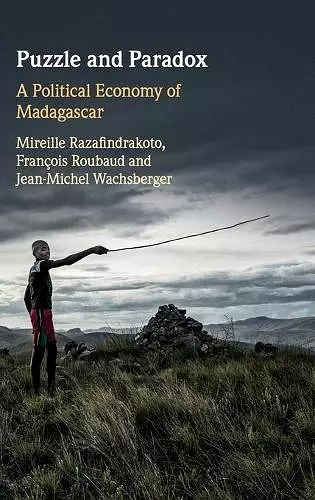Puzzle and Paradox
A Political Economy of Madagascar
Francois Roubaud author Mireille Razafindrakoto author Jean-Michel Wachsberger author
Format:Hardback
Publisher:Cambridge University Press
Published:6th Feb '20
Currently unavailable, our supplier has not provided us a restock date

Analyses the economic and political history of Madagascar from independence to the early twenty-first century.
Madagascar's long-term trajectory is unique: not only has GDP per capita been trending downward since 1960 (the puzzle), but every time the country has set out on the path of growth, it has been stopped in its tracks by a socio-political crisis that has shattered the hopes it raised (the paradox). No satisfactory explanation of this failure has been provided so far. This book elaborates a model of intelligibility of Madagascar's downfall, based on an integrated political economy approach as well as mobilizing the most recent development theories. Combining a review of historical literature with original and sometimes unique statistical surveys, it proposes a general interpretative framework for the workings of Malagasy society. Richly documented and accessible, Puzzle and Paradox allows readers to understand Madagascar's sociopolitical history while more broadly offering an opportunity to grasp the different dimensions of development in the Global South.
'The economy of Madagascar is quite unlike that of other states on the African continent. Puzzle and Paradox is a rare attempt to understand this phenomenon at a fundamental level. This book is sure to make us reconsider the entire issue of development much more critically.' Maurice Bloch, London School of Economics
'This book develops a skillful and timely perspective of Madagascar's political economy in order to address why income per head in Madagascar declined by one third between 1950 and 2015, while tripling in other sub-Saharan economies. This assessment of the potential causes, underlying the unusual short cyclicity of economic booms and political bursts, will be helpful in designing sustainable progressive reforms, especially at a time when sustainable development goals are focusing on local developments.' Pascal Petit, CNRS Director of Research, Centre d'Economie de Paris Nord, University of Paris
'This book provides a convincing answer to the riddle of Madagascar, a poor country despite its many assets. Madagascar's misfortune has its roots in a hierarchical, atomized society whose secular immobilism is marked by brief surges of hope repeatedly dashed by ruinous political and economic crises.' Jean Fremigacci, University of Tananarive
ISBN: 9781108488334
Dimensions: 235mm x 156mm x 21mm
Weight: 540g
302 pages